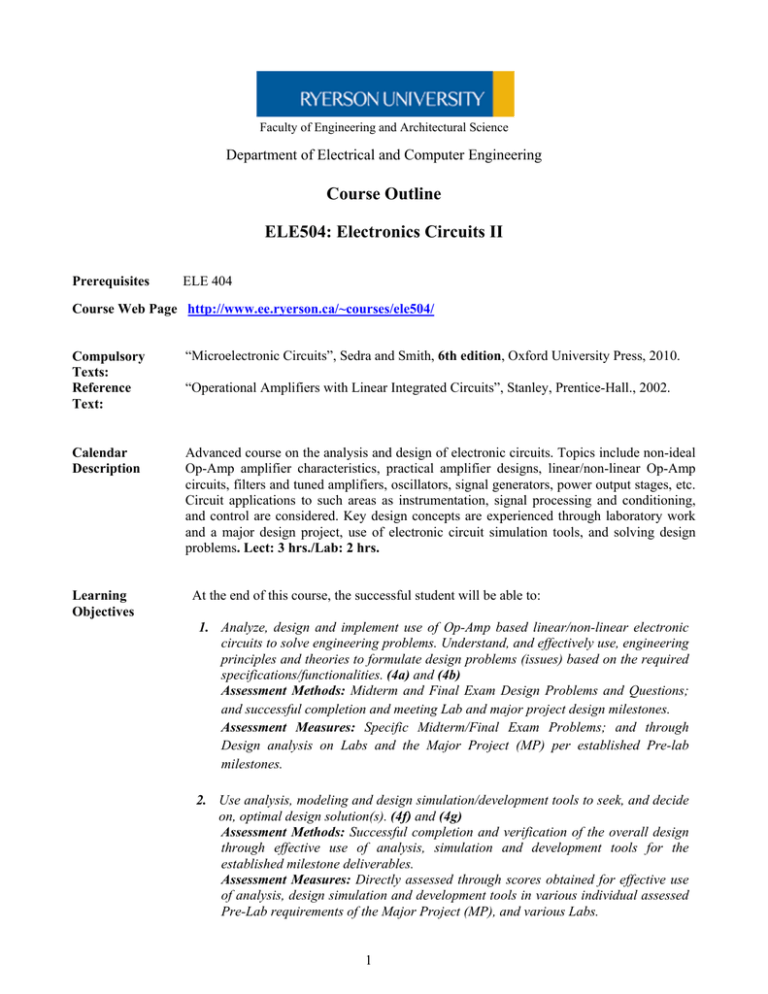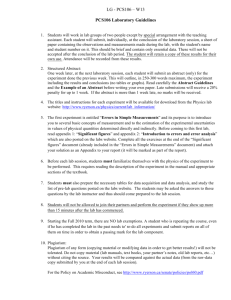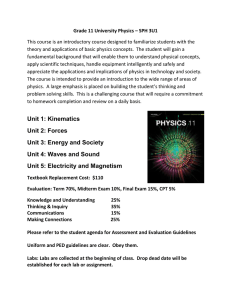ELE504 Electronic Circuits II - Department of Electrical and
advertisement

Faculty of Engineering and Architectural Science Department of Electrical and Computer Engineering Course Outline ELE504: Electronics Circuits II Prerequisites ELE 404 Course Web Page http://www.ee.ryerson.ca/~courses/ele504/ Compulsory Texts: Reference Text: “Microelectronic Circuits”, Sedra and Smith, 6th edition, Oxford University Press, 2010. Calendar Description Advanced course on the analysis and design of electronic circuits. Topics include non-ideal Op-Amp amplifier characteristics, practical amplifier designs, linear/non-linear Op-Amp circuits, filters and tuned amplifiers, oscillators, signal generators, power output stages, etc. Circuit applications to such areas as instrumentation, signal processing and conditioning, and control are considered. Key design concepts are experienced through laboratory work and a major design project, use of electronic circuit simulation tools, and solving design problems. Lect: 3 hrs./Lab: 2 hrs. Learning Objectives “Operational Amplifiers with Linear Integrated Circuits”, Stanley, Prentice-Hall., 2002. At the end of this course, the successful student will be able to: 1. Analyze, design and implement use of Op-Amp based linear/non-linear electronic circuits to solve engineering problems. Understand, and effectively use, engineering principles and theories to formulate design problems (issues) based on the required specifications/functionalities. (4a) and (4b) Assessment Methods: Midterm and Final Exam Design Problems and Questions; and successful completion and meeting Lab and major project design milestones. Assessment Measures: Specific Midterm/Final Exam Problems; and through Design analysis on Labs and the Major Project (MP) per established Pre-lab milestones. 2. Use analysis, modeling and design simulation/development tools to seek, and decide on, optimal design solution(s). (4f) and (4g) Assessment Methods: Successful completion and verification of the overall design through effective use of analysis, simulation and development tools for the established milestone deliverables. Assessment Measures: Directly assessed through scores obtained for effective use of analysis, design simulation and development tools in various individual assessed Pre-Lab requirements of the Major Project (MP), and various Labs. 1 3. Use of engineering tool (MultiSim Electronics Circuit Simulator) to allow verification of design/problem analysis through use of real devices’ simulation models. (5c) Assessment Methods: Successful completion and verification of the Pre-Lab assigned design/problem analysis using the MultiSim Simulation tool. Assessment Measures: Directly assessed through scores obtained for successful completion and effective use of Simulation tool based on individually assigned PreLab design/problems in the Major Project (MP), and various Labs. 4. Demonstrate the main design features of the Major-Project and answer critical and project specific questions during project demo and oral sessions. Write a formal technical report (following the prescribed template and guidelines) reflecting the design process used for the Major Project (MP), where all the reports are evaluated based on their completeness, technical content and proper use of the English language. (7a) Assessment Methods: Demonstration of the Major Project (MP), and assess answers to critical and design specific questions; and through Formal technical report of the Major Project. Assessment Measures: Evaluation of the Individual component of the Major Project (MP) through demonstration and oral questions; and formal technical report. Course project summary and interim report grading. Note: Numbers in parentheses refer to the graduate attributes required by the Canadian Engineering Accreditation Board. For more information, see: http://www.feas.ryerson.ca/quality_assurance/accreditation.pdf Course Organization 3 hours of lecture per week for 13 weeks. 2 hours of lab per week for 12 weeks. 1 Teaching Assistant (TA) per 24 students. Course Evaluation Midterm exam Major Project (MP) Labs [L1-A (3%), L1-B (4%), L2 (5%) & L3 (3%)] Final exam Total 25% 15% 15% 45% 100% Midterm Exam:- A single midterm exam will be held. No make-ups will be held for a missed midterm exam. Major Project & Individual Labs:- The Pre-Lab assignments will be graded for each student, whereas the in-lab work and lab reports (short-form and formal) are graded for each lab-group’s contribution. Details on the grading scheme and deliverables are provided in each Lab/MP descriptions available on the ELE504 course website. To achieve a passing grade, student must pass both the Theory (Midterm & Final Exams) and Laboratory/project (Labs and MP) components. 2 Examinations Midterm exam is normally in Week 7 (TBA), 2.0 hours, closed book (covers Weeks 1-6 of course material). Final exam scheduled during December exam-period, 3 hours, closed book (covers Weeks 1-13 of course material). Course Content Topic Description Operational Amplifiers Ideal Op-Amp & Applications – Review Difference Amplifiers Non-Ideal Op-amp: DC imperfections Finite open-loop gains and bandwidths Large signal operations Integrators and Differentiators Practical Applications Approx. Hours 8 Text - sections 2.1,2.2,2.3 2.4 2.6 2.7 2.8 2.5 10 Waveform Shaping Circuits 17.4 17.5 4.5 17.9 17.6, 17.7 Bistable Multivibrators Square and Triangular waveform generations Basic Rectifier & Superdiode Precision Rectifier Circuits Pulse Generation & Integrated-Circuit Timers Practical Applications 2 8 Midterm Exam Signal Generators Oscillation principles Op-amp – RC Oscillators LC and Crystal Oscillators Practical applications TBA 17.1 17.2 17.3 7 Active Filters Filter Concepts Butterworth filters Chebyshev filters Second order filters (Sallen Key) Sensitivity analysis 16.1, 16.2 16.3, notes. 16.3, notes. 16.4,16.5 16.9 Output Stages of Power Amplifiers Class A Class B Class AB 4 11.1 11.3 11.4, notes. 3 Course Content Analysis Major Design Project & Labs Mathematics & Basic Science 5% Engineering Science Engineering Design 40% 55% Refer to the detailed project description & deliverables of the Major Design Project and each Lab, available on the ELE504 course website. Labs & Major Project - Schedule Week Week of:- Project Activities No Lab – Purchase Kit on Friday 5th, 2014 in Room ENG310 Select OpAmp Circuits (Review) - submission of Short-Form report on next scheduled lab period. Non-ideal OpAmp Characteristics & Design – analysis & expt. Design implementation, testing and demo + submission of ShortForm report on next scheduled lab period. VCFG Design: Analysis & Simulations 1 2 Sep. 2nd - 5th Sep. 8th -12th --L1A 3 4 Sep. 15th -19th Sep. 22nd- 26th L1B L1B 5 Sep. 29thOct.3rd Oct. 6th -10th Oct. 14th -20th Oct. 21st -27th Oct.28th Nov.3rd Nov. 4th - 10th Nov. 11th 17th Nov. 18th 24th Nov.25th– Dec.1st MP 6 7 8 9 10 11 12 13 MP MP MP MP L2 L2 L2 L3 Design analysis, implementation & testing [Milestone #1] Design implementation & testing [Milestone #2] Design implementation, testing & demonstration [Milestone #2/3] Final design demonstration; + Formal report due on next scheduled lab period [Milestone #3/4] Oscillators & 555 Timer designs. - PreLab (i) & (iii) due. PreLab (ii) due. Final design demonstration of parts (A) and (C). Design demo of part (B) + submission of Short-Form report on next scheduled lab period. Butterworth & Chebyshev LP Filter Design:Design demonstration + submission of deliverables by end of week. The Pre-lab will include design and simulations of Butterworth and Chebyshev filters but only the Butterworth filter is required to be implemented and tested in the Lab. The shortform lab report is due no later than Monday, December 1st. The Monday lab sections on Dec 1st can hand in the lab report by the end of the following day. Notes:1) Failure to submit and/or demonstrate the above deliverables as scheduled will result in an automatic zero mark for each of the missed milestone. No exceptions. 2) Each student must complete the analysis/evaluation of his/her project design work (Pre‐Lab) for each lab, prior to carrying out each project in the lab. 3) Laboratory materials and Supplementary Lecture Notes are posted on the Blackboard. 4) It is the student's responsibility to have all required circuit components ready prior to the start of each lab. 5) Lab kit will be sold on Friday, Sept. 5th, 2014 from 10:30am – 4:30pm, in Room ENG 310. 4 6) If there are kits left over, they will be available for purchase in room ENG418 from 12:15PM to 1PM, until September 30th. 7) If you wish to purchase the lab components elsewhere, a list of components in the lab kit is posted in the “Labs” folder of the BlackBoard. 8) If there is any change on the laboratory activities, lecture materials, or counseling hours, announcement will be made on BlackBoard. Important Notes 1. All of the required course-specific written reports will be assessed not only on their technical/academic merit, but also on the communication skills exhibited through these reports. 2. All assignment and lab/tutorial reports must have the standard cover page which can be completed and printed from the Department website at www.ee.ryerson.ca. The cover page must be signed by the student(s) prior to submission of the work. Submissions without the cover pages will not be accepted. 3. Students who miss a final exam for a verifiable reason and who cannot be given a make-up exam prior to the submission of final course grades, must be given a grade of INC (as outlined in the Grading Promotion and Academic Standing Policy) and a make-up exam (normally within 2 weeks of the beginning of the next semester) that carries the same weight and measures the same knowledge, must be scheduled. 4. Medical or Compassionate documents for the missing of an exam must be submitted within 3 working days of the exam. Students are responsible for notifying the instructor that they will be missing an exam as soon as possible. 5. Requests for accommodation of specific religious or spiritual observance must be presented to the instructor no later than two weeks prior to the conflict in question (in the case of final examinations within two weeks of the release of the examination schedule). In extenuating circumstances this deadline may be extended. If the dates are not known well in advance because they are linked to other conditions, requests should be submitted as soon as possible in advance of the required observance. Given that timely requests will prevent difficulties with arranging constructive accommodations, students are strongly encouraged to notify the instructor of an observance accommodation issue within the first two weeks of classes. 6. The results of the first test or mid-term exam will be returned to students before the deadline to drop an undergraduate course in good Academic Standing. 7. Students are required to adhere to all relevant University policies including: Undergraduate Grading, Promotion and Academic Standing, http://www.ryerson.ca/senate/policies/pol46.pdf Student Code of Academic Conduct, http://www.ryerson.ca/senate/policies/pol60.pdf Student Code of Non-Academic Conduct, http://www.ryerson.ca/senate/policies/pol61.pdf Undergraduate Academic Consideration and Appeals, http://www.ryerson.ca/senate/policies/pol134.pdf Examination Policy, http://www.ryerson.ca/senate/policies/pol135.pdf Accom. of Student Relig., Abor. and Spir. Observance, http://www.ryerson.ca/senate/policies/pol150.pdf Est. of Stud. Email Accts for Official Univ. Commun., http://www.ryerson.ca/senate/policies/pol157.pdf 8. Students are required to obtain and maintain a Ryerson Matrix e-mail account for timely communications between the instructor and the students. 9. Any changes in the course outline, test dates, marking or evaluation will be discussed in class prior to being implemented. 10. In-class use of cellular telephones is not permitted. Please turn off your cell phone prior to class. Quiet use of laptops, text-messengers and similar non-audible devices are permitted only in the rear rows of the class. This restriction allows use of such devices by their users while limiting audible and visual distractions to other students. This policy may change without notice. 11. Labs, projects handed in past the due date and time will not be accepted for marking and will receive a mark of ZERO. In some genuine cases late submission will be allowed with a penalty of 5% per day. 12. Students found to have plagiarized any portion of their labs and final project will receive a grade of zero. Instructor _______________________________ Date ______________________________ Approved by _______________________________ Date ________________________________ Program Director /Chair 5


